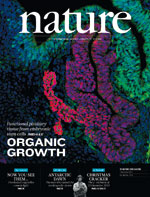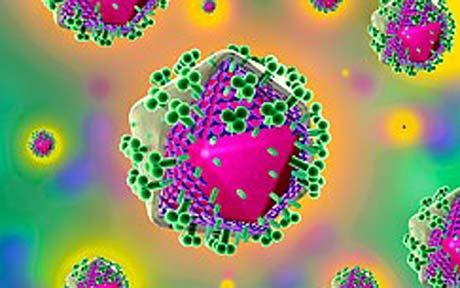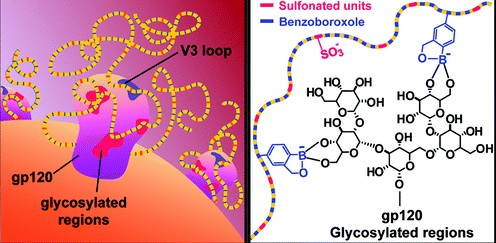Nature:艾滋病基因疗法在动物体内效果显著
2011-12-02 MedSci原创 MedSci原创
2011年12月1日是“世界艾滋病日”,英国《自然》杂志网站11月30日刊登了来自美国加州理工学院等机构研究人员的最新研究成果"Antibody-based protection against HIV infection by vectored immunoprophylaxis”,他们探索出的一种艾滋病基因疗法在动物实验中取得成效。实验证明感染大剂量艾滋病病毒的实验鼠也可受到保护。
2011年12月1日是“世界艾滋病日”,英国《自然》杂志网站11月30日刊登了来自美国加州理工学院等机构研究人员的最新研究成果"Antibody-based protection against HIV infection by vectored immunoprophylaxis”,他们探索出的一种艾滋病基因疗法在动物实验中取得成效。实验证明感染大剂量艾滋病病毒的实验鼠也可受到保护。

美国加州理工学院等机构的研究人员报告说,通过使用一种经过改造的腺病毒,可以在实验鼠肌肉细胞的基因序列中加入一段代码,使得肌肉细胞能够生成和分泌一些抗体。这些抗体具有帮助机体抑制艾滋病病毒的作用,最初是在一些对艾滋病有抵抗力的患者体内分离得到的。
研究人员用这种基因疗法测试了5种不同抗体的效果,结果发现,两种代号为B12和VRC01的抗体效果尤其良好。即使对实验鼠施加比天然感染艾滋病所需病毒量高出100倍的病毒剂量,这两种抗体也能起到完全且持续的保护效果,实验鼠在接受治疗一年后仍能避免发病。这是因为实验鼠的肌肉细胞在基因序列被改变后,会持续生成相关抗体并释放到血液中。
参与研究的戴维·巴尔的摩说,动物实验的成功为接下来开展人类临床试验铺平了道路。虽然通常只用基因疗法治疗遗传病,但目前在与艾滋病的斗争中还没找到完全有效的疗法,因此基因治疗艾滋病值得一试。
据介绍,这种疗法可能导致相关细胞的基因序列永久性改变,或许会带来副作用。研究人员希望能在临床试验中确定该基因疗法是否有副作用并找到规避方法。(生物谷Bioon.com)
Antibody-based protection against HIV infection by vectored immunoprophylaxis
Alejandro B. Balazs,Joyce Chen,Christin M. Hong,Dinesh S. Rao,Lili Yang& David Baltimore
Despite tremendous efforts, development of an effective vaccine against human immunodeficiency virus (HIV) has proved an elusive goal. Recently, however, numerous antibodies have been identified that are capable of neutralizing most circulating HIV strains. These antibodies all exhibit an unusually high level of somatic mutation, presumably owing to extensive affinity maturation over the course of continuous exposure to an evolving antigen. Although substantial effort has focused on the design of immunogens capable of eliciting antibodies that would target similar epitopes, it remains uncertain whether a conventional vaccine will be able to elicit analogues of the existing broadly neutralizing antibodies. As an alternative to immunization, vector-mediated gene transfer could be used to engineer secretion of the existing broadly neutralizing antibodies into the circulation. Here we describe a practical implementation of this approach, which we call vectored immunoprophylaxis (VIP), which in mice induces lifelong expression of these monoclonal antibodies at high concentrations from a single intramuscular injection. This is achieved using a specialized adeno-associated virus vector optimized for the production of full-length antibody from muscle tissue. We show that humanized mice receiving VIP appear to be fully protected from HIV infection, even when challenged intravenously with very high doses of replication-competent virus. Our results suggest that successful translation of this approach to humans may produce effective prophylaxis against HIV.
本网站所有内容来源注明为“梅斯医学”或“MedSci原创”的文字、图片和音视频资料,版权均属于梅斯医学所有。非经授权,任何媒体、网站或个人不得转载,授权转载时须注明来源为“梅斯医学”。其它来源的文章系转载文章,或“梅斯号”自媒体发布的文章,仅系出于传递更多信息之目的,本站仅负责审核内容合规,其内容不代表本站立场,本站不负责内容的准确性和版权。如果存在侵权、或不希望被转载的媒体或个人可与我们联系,我们将立即进行删除处理。
在此留言













#Nat#
44